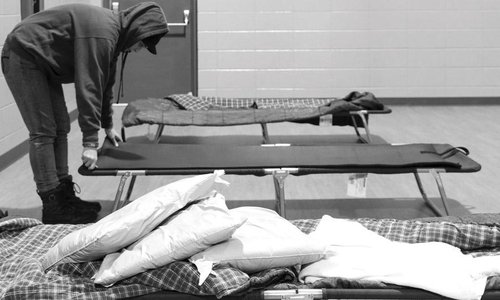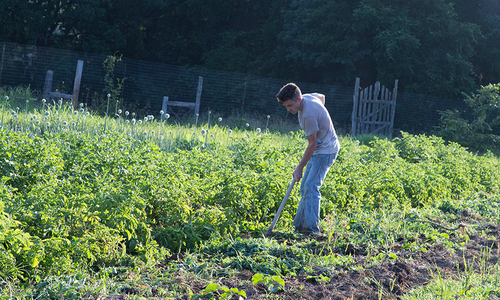Profiles
Profile: Maggie McDowell
Corporal Maggie McDowell is the Springfield Police Department’s version of CSI and Law & Order: SVU combined. But TV shows have nothing to do with what drives her to be a sexual crimes investigator.
By Jeff Houghton
Oct 2009
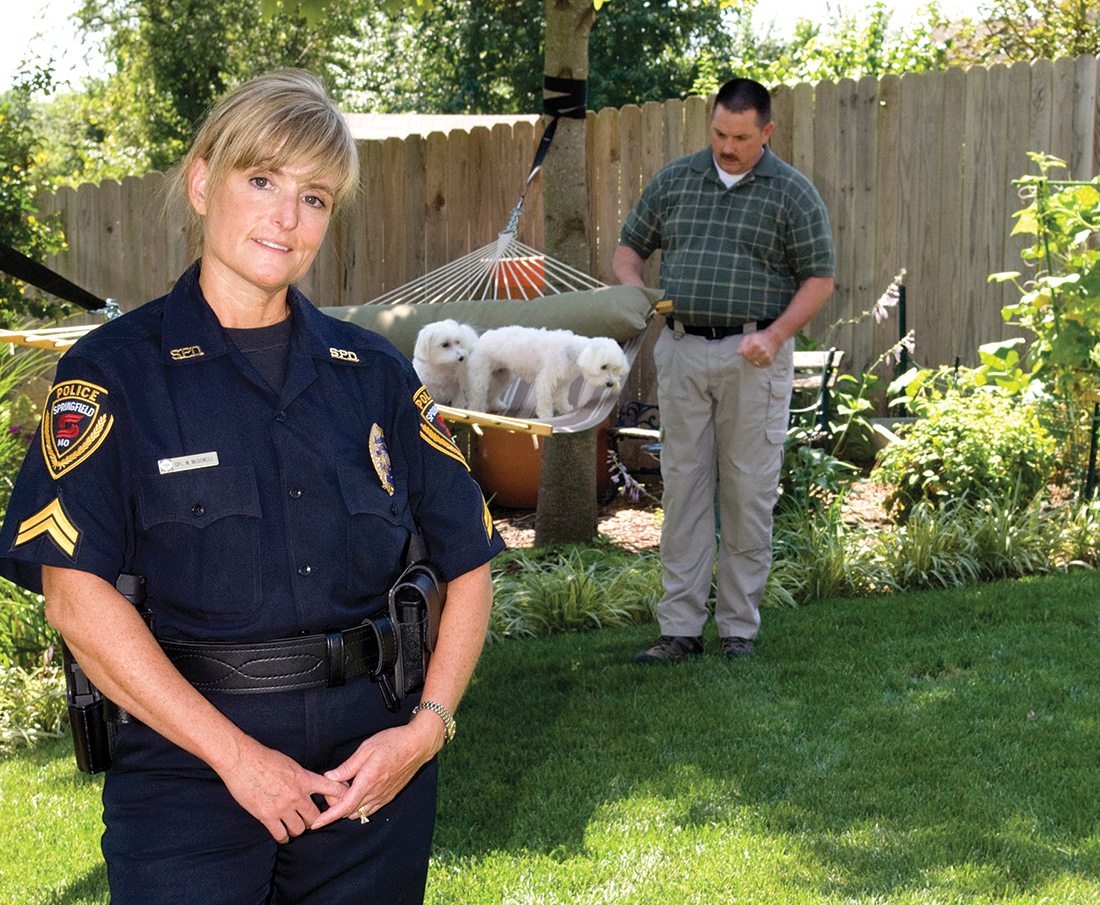
Maggie McDowell has two small Maltese dogs, Sassy and Sophie. McDowell loves to take them on walks and runs. Sassy is four and has had about enough. “I say, ‘walk,’ and Sassy will go run and hide in her crate,” explains McDowell. On the other hand, she says, “Sophie will twirl around with excitement.” It’s hard to blame Sassy though. McDowell takes the little dogs on runs for as long as seven miles. “That dog [Sophie] will go forever and still terrorize the birds in the yard when we get home,” says McDowell.
The same could be said of McDowell herself. She may not twirl with excitement, but she does have unending passion and energy for what she does. McDowell is Corporal McDowell of the Springfield Police Department. She has been a sexual crimes investigator with the Criminal Investigations Division for the last eight years. In that time, she’s worked on 950 cases and is currently working on 30.
McDowell does not come across as hardened or worn by the realities of her job. In fact, her personality is in stark contrast to the world she works in. Perhaps it has to be that way. She speaks in a lively and matter-of-fact manner. “She’s energetic, and really focused,” explains McDowell’s husband, Randy, who is also with the Springfield Police Department as the academy coordinator. “She’s a people person.”
McDowell’s career path has defied the typical. In 1990, she started volunteering at The Victim Center as an advocate. After some ride-alongs with the police officers with whom she worked closely at the center, she decided to become at cop herself at the age of 34. “If you told me 20 years ago that I would be a cop, I would have laughed in your face,” says McDowell. “I never even dreamed of doing it.” Now, after 15 years in the police force, she can’t imagine doing anything else. “The more I work these cases, the more I love it,” says McDowell. “I mean seriously love it.”
From the outside, it looks like an odd job to love. There are the interviews with victims who have been through an unimaginably traumatic experience. There are the tense interviews with the suspects. Then she has to transcribe those interviews (“the worst part of my job,” says McDowell). Then she has to get enough evidence to make a solid case, and finally, she spends hours sitting and waiting in the courtroom. It takes a deep well of motivation to deal with all of those details ranging from the emotionally wrenching to the mundane. “To me, it’s kind of a calling,” says McDowell. “I really just love dealing with my victims. I like to be able to come in here and see how incredibly frightened they are and to put them at ease and to see that transformation when they sit here with you for an hour. It’s important to be able to get them to trust you.” McDowell sums it up. “It’s just me letting them know that they’re believed, and it’s not their fault, and there’s help for them.”
“They just didn’t talk about it then. I thought it was my fault. Everything the victims tell me today is what I felt. That’s why I’m so motivated to want to change that.”— Corporal Maggie McDowell
The passion for her job is sustained largely by personal experience. McDowell was 18 years old in 1978 when she herself was raped. “It was forcible,” says McDowell. “He had a weapon. I never reported. I never told the police.” She speaks of her rape frankly, without the shame and the hushed tones that often accompany dark memories. “I didn’t even know it was rape,” she says. “They just didn’t talk about it then. I thought it was my fault.” Everything the victims tell me today is what I felt. That’s why I’m so motivated to want to change that.”
Her own experience has perhaps been her most important tool for helping the victims. “I think it’s huge, because that’s a disclosure I do make to some people because it puts them more at ease,” explains McDowell. “It’s kind of like that old saying, I understand because I’ve been there, and I’ve walked in your shoes, and I can relate. It seems like more and more I tend to come out with it because I know there is no shame in it.”
Randy explains that she does more than just walk in the victim’s shoes. Sometimes she drives them. “She goes out of her way to take care of her victims,” says Randy. “They are her number one priority. If it wasn’t for the victims, she wouldn’t be doing it at all. I know she’s given them rides for trials. She’s gone out of her way to go pick them up and get them where they needed to go. She just does that constantly.”
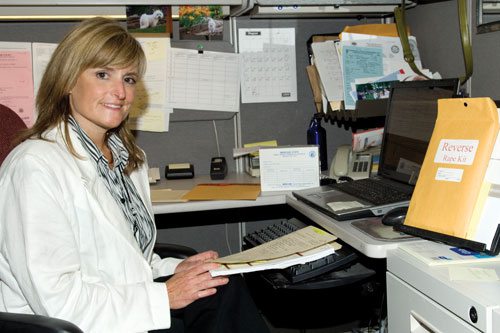
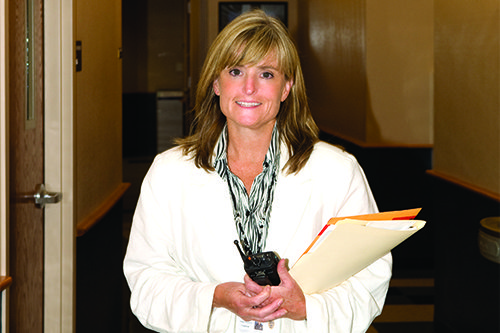
Typically, people in high-stress, high-stakes jobs remove themselves emotionally from their job as a necessity. It is quickly apparent that this is something that makes McDowell different. “Sometimes I go home, and I cry. If I get an acquittal, or I try really hard to get a case prosecuted, and it doesn’t happen, and I call that victim and they’re upset and they cry, then that’s hard. That’s real hard,” says McDowell.
McDowell does manage to leave work at work. It’s a great benefit that Randy is also a cop. “It helps a lot,” says McDowell. “I can go home and talk to him about it. We’ve been married for two years and together for 12. You just completely understand. If I get called out at one or two in the morning, he understands.” It also helps that McDowell is a fitness enthusiast. She has completed nine marathons and numerous triathlons. When she’s stressed, McDowell says, “I’ll run or lift weights. I try to take care of myself that way, which really helps, too.”
Yet of all those, the best diversion for her is her gardening. “I’m a huge, avid, flower gardener,” says McDowell. “My whole yard is like a botanical garden. It is highly addictive. Randy’s always joking. He’ll come home and say, ‘Did you move a tree today?’” Randy explains further, “I have the only house in the Greene County area where a plant moves every day. You’d have to see our yard to believe it.”
McDowell has a hard time sitting still. “I’m incredibly energetic and high strung, but at 49, I’ve slowed down a lot,” says McDowell. She still goes at a pace that most of us would call sprinting. In fact, this spring she was recognized by the Springfield Sergeant’s League as the Corporal of the Year. In a profession that relies on camaraderie and teamwork, the recognition of her peers is surely meaningful.
In the end, it still comes down to the victims. “My mission is to make sure victims know that we are approachable. I can’t guarantee to get the end result that they want to see, but come forward and make a report. I want them to see cops as approachable, that we really do care,” says McDowell. “You wouldn’t do this job if you didn’t care."









